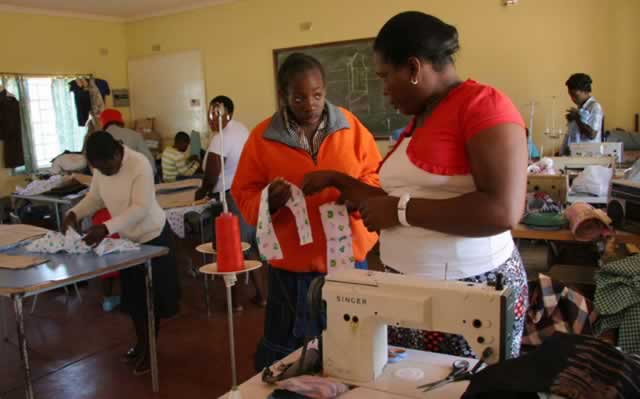Hope for vulnerable children

Stanely Mushava Features Correspondent
The occasion is Christmas. A Chivhu teacher visits the local prison to witness the other side of the holiday away from family reunions and festive cheer.
Chipo Muteve has been at Chivhu Prison before to minister the gospel, restore hope and equip inmates with certainty for a new life beyond the cells. This time she has brought food provisions for the prisoners and to have one to one conversations with them as most of them are not expecting visits from their families.
One elderly man, known to inmates as Whitehead, tells Muteve he was jailed for growing marijuana in his backyard. Being a widower, he left his seven-year old daughter on her own when he was thrown behind bars.
“The girl was born with HIV and she needs regular check-ups at the hospital and to collect her ART medication,” Whitehead cries as he narrates his daughter’s story to Muteve.
“As a young child she needs to be pushed to take her medication. Can you go and see my daughter regularly. See to it that she goes for her medical check-ups and general upkeep,” Whitehead pleads with Muteve.
That 2009 encounter became a turning point for Muteve, the big-hearted teacher who has since left the staff-room to devote all her time to philanthropic work.
She would check on the infant and support her with necessary provisions until Whitehead finished his prison term.
When the man had served time Muteve gave him different seed to grow and a “start” for poultry production so that marijuana would not separate him from his daughter again.
That was the beginning of Agape Love Behind The Walls Ministry, founded on Muteve’s understanding that “behind every prisoner there is a vulnerable and hurting child.”
The ministry cares for children of inmates in Chivhu and helps ex-offenders reunite with their families and reintegrate with mainstream society. Muteve’s initiative is one of several targeted at protecting and sharing love with vulnerable children caught up in various disadvantages. Child-oriented charities in Zimbabwe, both secular and Christian-based, care for orphaned, abandoned, neglected and disadvantaged children.
Matthew Rusike Children’s Home, Mustard Orphan Care, Chinyaradzo Children’s Home, Grace Mugabe Children’s Home, Autism Organisation Zimbabwe, Harare Children’s Home, Runyararo Children’s Home and St Joseph’s Home for Boys are among sanctuaries for children in Zimbabwe.
Children’s charities have come a long way and some of their alumni have been empowered, professionally positioned and successfully reintegrated. Some have given their hearts into the cause which helped them maximise their potential and rediscover the life they thought was all lost.
Not all charities are widely known others are small-scale, local para-church initiatives. In either case, their initiatives must be credited for maintaining the Christian mandate of bearing one another’s burdens. Children have long been used as human shields in problems and conflicts beyond their comprehension, a tragedy immediately evident in war-riven trouble spots. However, deprived and violated children are not only the pawns on political chessboards but also those exposed to harm by parental negligence.
Only last morning, Harare woke up to the sight of baby dumped in a bin near the Fourth Street terminus.
Reports of abandoned and neglected children run the tapestry of tabloids as children are sometimes counted negligible when parents are bent to their own interests. Interestingly, most of the great charity initiatives come about not because of the abundance of resources but because of the touch of love.
The Matthew Rusike Children’s Home Childcare resulted from the yearning of the late Methodist clergyman Rev. Matthew Rusike to provide a Christian sanctuary for orphaned and vulnerable children. The clergyman mobilised the church to establish a residential care facility for the children in Epworth in 1960.
The charity, registered eight years later, is one of the enduring examples of this domain. Seventy six years on, the clergyman’s project now cares for more than 6, 000 children under a two-point scheme that combines residential care and community based orphan care initiatives, with a staff compliment of 50 seeing to the upkeep of the children.
Around two decades before Rusike’s initiative, highly regarded Christian philanthropist Jairos Jiri from Bikita, Masvingo, had kindled a light nothing would extinguish not so much driven by a deep pocket but a big heart.
Coming to town from the village, Jiri was moved by the suffering of so many and drawing from the virtues patience and tolerance, sheltered, rehabilitated and trained the disabled in facilities which soon became renowned for the art and furniture. His centre is one of the enduring references for charity initiative in the country. Interestingly, some of the alumni from Jairos Jiri have become forces for good in their own right, particularly for the welfare of vulnerable children.
Chipo Muteve grew up at Jairos Jiri Centre after her mentally ill mother and blind father had been admitted following issues of integration with mainstream society. Muteve became a teacher in Chikomba district but it did not take her long before a series of interactions with disadvantaged children and parents in the community drew her to full-time charity work. One such interaction was a 1996 incident with a child in her class at Madzivire Primary School.
“One day while I was doing my work, I noticed that a young girl called Emilia was not writing and I asked her why she was not writing and she replied that she did not have a pen,” Muteve said.
“I told her to go and get a pen, and later that day saw her and her sister, Imelda hugging and crying together. I discovered that they were orphans and, realising their need, and provided each of them with a pen and an exercise book,” she recounted.
She took it upon her herself to support these girls until they finished and passed their O-Level.
“The two girls are now happily married and have their own children. They both intend to go and train as nurses in 2013,” Muteve said.
What began as a simple act of kindness gave birth to Mustard Seed Orphan Care Centre which currently supports 120 children with school fees, stationery, uniforms, payment for educational tours, medical care including specialist check-ups, psycho-social support, food and Christian-oriented spiritual support from ECD up to university.
“Several beneficiaries have matured and are ably looking after their families. Pamela Shaninga graduated as a medical laboratory scientist from the UZ and currently is working for Premier,” Muteve said.
Six of the Mustard Seed beneficiaries are at university with two in third year at National University of Science and Technology (Nust) and University of Zimbabwe (UZ), two in second year at Bindura University of Science Education (BUSE) and two in first year at UZ and MSU.
Muteve maintains six theme-specific interventions, including the prison ministry, interventions for the mentally ill and those affected by HIV/AIDS.
“We want to empower people into capable adults and to break the AIDS cycle,” Muteve said.
Muteve’s labour of love for the disadvantaged following her own background at Jairos Jiri Centre shows that one act of kindness triggers an endless cycle.
Leo Tolstoy’s class story, “What Men Live By” tells the story of an angel send to earth from heaven to learn three lessons about human suffering: what dwells in men (humanity in general), what is not given to men and what men live by.
The angel, just before leaving, relates his lessons to the household which sheltered him when he appeared among mankind as a vagabond: “I have learnt that all men live not by care for themselves but by love.”
What dwells in man, and sustains communities, is love; it is not given to man to know his needs; and what men live by is love. These three are the object lessons from Tolstoy’s parable.
“I remained alive when I was a man, not by care of myself, but because love was present in a passer-by, and because he and his wife pitied and loved me. The orphans remained alive not because of their mother’s care, but because there was love in the heart of a woman, a stranger to them, who pitied and loved them,” said Tolstoy’s angel.
“And all men live not by the thought they spend on their own welfare, but because love exists in man. I knew before that God gave life to men and desires that they should live; now I understood more than that. I understood that God does not wish men to live apart, and therefore he does not reveal to them what each one needs for himself; but he wishes them to live united, and therefore reveals to each of them what is necessary for all.
“I have now understood that though it seems to men that they live by care for themselves, in truth it is love alone by which they live. He who has love, is in God, and God is in him, for God is love,” he said.
Zimbabwe still has children in need, some being disoriented on the streets for lack of love and care and initiatives like the ones featured here will secure a future for the abandoned, orphaned and vulnerable.
More churches need to make charity work a central feature of their work as the original apostles did.









Comments